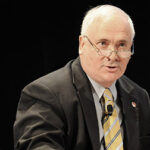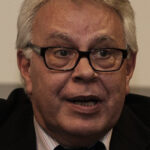Prime Minister of Ireland John Bruton and Presidents of Spain Felipe González and José Luis Rodríguez Zapatero, all three members of the Club de Madrid, met with 12 representatives of Libyan civil society (political party members, electoral commissioners or city council journalists, NGO members) from five cities: Darna, Benghazi, Azawia, Zelitin, and Ubary from April 1-5 at the Club de Madrid headquarters. All of the Libyan representatives were grassroots activists who are working for democratic transition in Libya.
This activity atracted the attention of media in Spain, Libya and aboard with articles among others in El País, El Mundo, International Herald Tribune and The New York Times. The initative was organized by the Club de Madrid , the European Center for Electoral Support (ECES), the Netherlands Institute for Multiparty Democracy (NIMD) and the European Alliance for Democracy (EPD) in the framework of SUDEL (Support of Democracy in Libya) and funded through the European Instrument for Democracy & Human Rights (EIDHR). Casa Árabe and Fundación Transición Española also cooperated in this activity
The three articles talked about the way the exchange of experiences can promote reconciliation in the context of the strengthening of democracy and the establishment of strong networks and connections between local leaders of the transitional process in Libya.
The International Heradl Tribune published an article for its Middle East printed edition focussing on how the transition in Spain and Ireland can set an example for the Libyan process. Under the tittle “Libya looks to Spain as a post dictator role model” the IHT’s article explains how “During one week in early April, a dozen Libyans from grassroots, pro-democracy groups—several of whom volunteer in nonpolitical roles for the General National Congress — attended sessions in Madrid on Spain’s post-dictatorial transition to democracy and on how the state interacts with its citizens”.
The New York Times also reflected this story on its online Global Edition.
El País, Spaim’s bestselling newspaper,interwieved two of the libyan delegates, Ahmed Fraisek and Nizar El Gibali and described their experiences during the revolution and challengues their country is facing through the transitional process such as reconciliation and national dialogue. As the article’s title says “The libyans have high expectations but change takes time”.
The five day study tour provided insight into how European countries such as Spain and Ireland have managed the democratic transitional process through the development of politics, programs, and institutions. Furthermore, the sessions had the participation of the following experts: Mohamed Alfageeh Saleh, the Libyan ambassador in Madrid; Inés Alberdi, former Executive Director of the United Nations Entity for Gender Equality and the Empowerment of Women; Soledad Becerril, Defensor del Pueblo; Fernando Vallespín, Professor of Political Science at the Autonomous University of Madri, among others.


